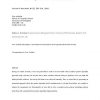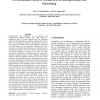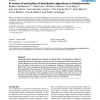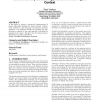110
Voted
CORR
2008
Springer
15 years 2 months ago
2008
Springer
This paper describes a Genetic Algorithms approach to a manpower-scheduling problem arising at a major UK hospital. Although Genetic Algorithms have been successfully used for sim...
103
Voted
CORR
2008
Springer
15 years 2 months ago
2008
Springer
During our earlier research, it was recognised that in order to be successful with an indirect genetic algorithm approach using a decoder, the decoder has to strike a balance betw...
144
Voted
CORR
2010
Springer
15 years 2 months ago
2010
Springer
Multiprocessor task scheduling is an important and computationally difficult problem. This paper proposes a comparison study of genetic algorithm and list scheduling algorithm. Bo...
131
Voted
BIODATAMINING
2008
15 years 2 months ago
2008
Evolutionary search algorithms have become an essential asset in the algorithmic toolbox for solving high-dimensional optimization problems in across a broad range of bioinformati...
162
Voted
GECCO
2010
Springer
15 years 2 months ago
2010
Springer
This paper takes an economic approach to derive an evolutionary learning model based entirely on the endogenous employment of genetic operators in the service of self-interested a...
103
click to vote
GECCO
2010
Springer
15 years 2 months ago
2010
Springer
In this paper we present a concurrent implementation of genetic algorithms designed for shared memory architectures intended to take advantage of multi-core processor platforms. O...
133
Voted
GECCO
2008
Springer
15 years 3 months ago
2008
Springer
A genetic algorithm (GA) was developed to implement a maximum variation sampling technique to derive a subset of data from a large dataset of unstructured mammography reports. It ...
103
click to vote
GECCO
2008
Springer
15 years 3 months ago
2008
Springer
The paper considers the problem of selecting individuals in the current population in Genetic Algorithms for crossover to find a solution of high fitness of a given combinatoria...
129
click to vote
GECCO
2008
Springer
15 years 3 months ago
2008
Springer
We are interested in engineering smart machines that enable backtracking of emergent behaviors. Our SSNNS simulator consists of hand-picked tools to explore spiking neural network...
100
Voted
GECCO
2008
Springer
15 years 3 months ago
2008
Springer
This paper introduces GLOCSA as a new scoring function to rate multiple sequence alignments. It is intended to be simple, considering the whole alignment at once and reflecting t...





